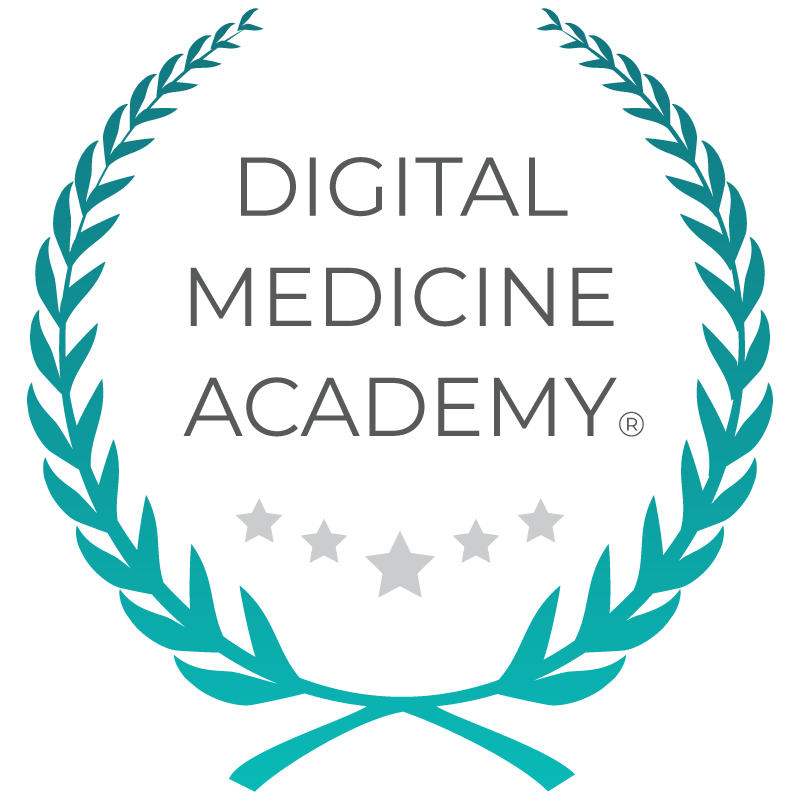Defining Digital Medicine
Table of contents
What is digital medicine?
Digital medicine…
- Describes a field concerned with the use of technologies as tools for measurement, intervention, and enhancing human health.
- Its products are driven by high-quality hardware, software, and increasingly, artificial intelligence (AI) that support the practice of medicine broadly, including treatment, recovery, disease prevention, and health promotion for individuals and across populations.
- AI-enhanced products can analyze large volumes of data, identify patterns, and enable predictive modeling, providing personalized care and decision support.
- These tools can function independently or in combination with pharmaceuticals, biologics, devices, or other technologies to optimize patient care and health outcomes.
- By empowering patients and healthcare providers with intelligent, accessible, and adaptive tools, digital medicine addresses a wide range of conditions through high-quality, safe, and effective measurements, AI-driven insights, and data-driven interventions.

- As a discipline, it encapsulates broad professional expertise and responsibilities regarding the ethical and evidence-based use of these tools. Digital medicine focuses on generating robust evidence to support the adoption of emerging technologies, including AI, across the healthcare continuum.
See how the DiMe community is using digital medicine in our Resources in Action Hub
Learn about other key terms and definitions
Search through over 100 uses of DiMe-developed definitions, including the definitions of digital medicine and virtual first care (V1C).
Navigating trust in digital medicine
In the digital era of medicine, a number of processes, best practices, and ethical norms have started to shift as we learn how to develop trustworthy technologies, including those powered by artificial intelligence. Sample paradigm shifts include the need to develop new methods for verification and validation, assessing clinical usability and human experience, addressing cybersecurity risks, and ensuring data rights and governance, especially with the rise of ‘digital specimen’ collection.
As digital medicine evolves, we must ensure that these technologies, particularly AI-driven ones, are worthy of the trust we place in them. Unlike “digital health” or “digital wellness” products, digital medicine products are characterized by a body of evidence supporting their quality, effectiveness, and safety.
Stay in touch with Digital Medicine Society
Be the first to hear about updates, new resources, and ways to get involved in driving digital innovation.

Who practices digital medicine?
The same individuals that practice traditional medicine: from pharmacists to physicians and nurses to health navigators. We also include medical researchers, from physician investigators to experts studying behavioral and population health.
In the era of digital medicine – and in particular the era of generative AI – new stakeholders are essential to the practice of digital medicine. This includes data scientists, AI ethicists, and regulatory experts who ensure the safe and responsible integration of AI into healthcare. Engineers and technologists developing AI tools will also play a critical role in supporting clinical decision-making and patient care.
Critically, we recognize the expanded role of the patient in the practice of digital medicine. With digital tools, including AI-driven platforms, decentralizing care outside of the hospital, clinic, and lab, patients will have a much more active role in managing their health. Using these tools in research will also expand the role of the citizen scientist, who can now leverage AI to contribute meaningfully to scientific discovery.
Enroll in our crash course

Would you like to build a fit-for-purpose regulatory strategy that strengthens your business strategy and differentiates your product in today’s digital health market? Take the course today!
Who are other stakeholders in digital medicine?

Developers of traditional (non-software) medical products — biopharma and medical device companies — are stakeholders in this field as the line between ‘traditional’ and ‘digital’ medicine continues to blur.

Clinical care providers remain at the center of medicine and are ultimately the experts who drive decision making at the point of care.

Data scientists will play an increasing role as the density of data available from digital data tools revolutionized our industry. Similarly, cyber-security experts and ethicists will have critical roles in this new, digital era in healthcare.

Experts in generative AI and large language models will play a crucial role in healthcare by developing personalized interventions, enhancing clinical decision-making, and optimizing patient outcomes. Their work will drive improvements in both clinical care and health economics, shaping the future of healthcare delivery.

Engineers — both hardware and software — will be central to the advancement of digital medicine, providing the tools this industry will be built on. They will need to work closely with other stakeholders to understand the nuances of a highly regulated industry built on individuals’ health data.

Funders — both government and non-governmental funding organizations that support health research will have significant impact on the direction and pace of the evolution of digital medicine.

Healthcare researchers design and execute studies that either provide the substrate for future digital development or examine digital tools themselves.

Patients are the stakeholders at the center of digital medicine, and we also recognize the critically important role of caregivers.

Physician-scientists are central to the discovery and development of novel measurements and treatments and are responsible for the ethical and safe conduct of research.

Regulators and payors will be as influential in digital medicine as they are in the development and practice of, as well as access to, traditional medicine.
Enhance your work with our resources
We’re here to help you excel in the digital era of healthcare. Browse and use DiMe’s open-access resources to improve and drive your digital and healthcare innovation efforts.
Don’t miss your opportunity to join upcoming projects
Are you ready to address pressing challenges in the digital medicine space? We’ve got exciting projects kicking off soon that will do just that.




